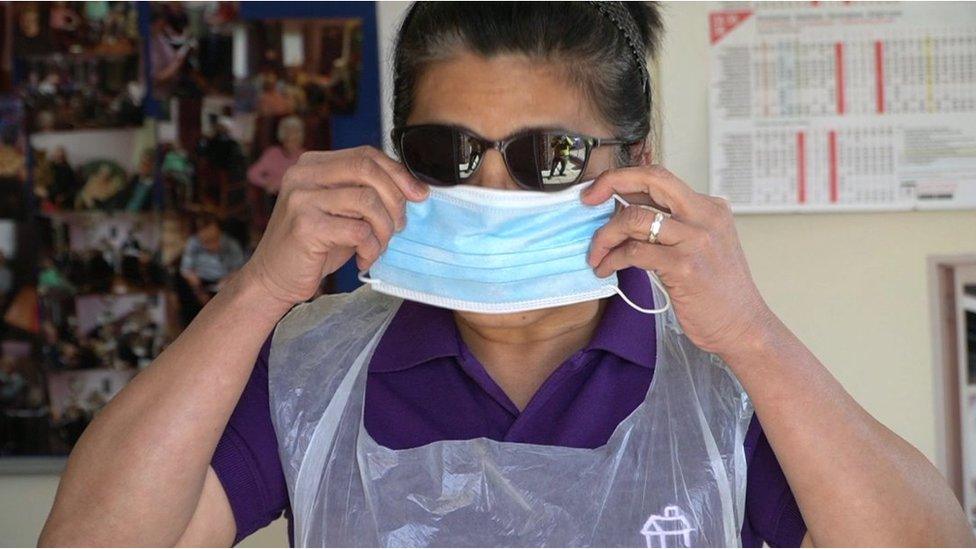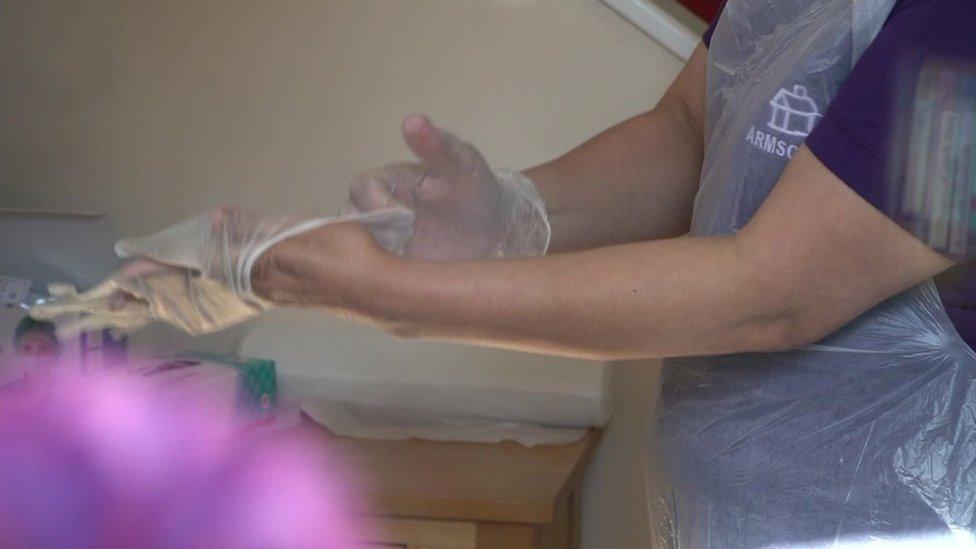Coronavirus: More visa extensions urged for foreign key workers
- Published

Campaigners want all foreign key workers to be eligible for free visa extensions
All foreign key workers who have been on the front line during the pandemic should be part of the government's free visa extension scheme, say campaigners.
Some migrant workers must pay thousands of pounds for new visas to stay in the UK, despite playing a vital role in keeping the country going.
In March, the Home Office brought in a one-year free visa extension for some staff in the NHS and care sectors.
The list was initially limited to NHS doctors, nurses and paramedics.
For those eligible, the extension covers visas which expire between 31 March and 1 October 2020.
Last month, Home Secretary Priti Patel extended the scheme to more NHS staff, including radiographers and social workers, and said some social care staff would also benefit.
But the list does not include jobs like porters and cleaners.
'Thousands overlooked'
"The visa extension scheme is what you get when a minister asks 'what is the very least we could do right now, whilst looking like we are doing something,'" says Satbir Singh, chief executive of the Joint Council for the Welfare of Immigrants
"It's overlooked hundreds of thousands of people within the health system and outside, and other key roles."
Mr Singh believes the scheme should be extended to key workers in and beyond the NHS and care sector, for example, bus drivers, a number of whom have died during the pandemic.
"Just a few weeks ago this government was referring to those excluded as low-skilled and unwelcome," argues Mr Singh.
"But they have proven over the last few months that they are the backbone of our society. They are still being treated as disposable."

Michelle, who has cleaned Covid wards at a big London hospital throughout the pandemic, feels the government does not recognise her front-line role.
Her visa expires on Friday and if she wants to continue living in the UK and carry on with her cleaning job, she will have to pay £2,000 to renew it, as she is excluded from the free visa extension scheme.
"I clean toilets, kitchens, the coronavirus patients' rooms, the corridors. I feel scared," she told the BBC.
"One of my sons said: 'Mummy please don't go to work, I don't want you to die.'
"I see people die every day, I see terrible things that I will never forget in my life."
'Treat us equally'
Michelle is a single mother from west Africa and has a daily three-hour round trip to work, which involves travelling on a bus and a train.
She is proud of the part she has played in the pandemic: "I have to save lives. If I stop going, who will do the job?
"Everybody can't be a doctor, everybody can't be a nurse. We work as a team. They should treat us all equally."
Michelle is being helped by the migrant and refugee support charity Praxis. Half of her £2,000 visa cost goes towards the Immigration Health Surcharge , externalwhich allows those with visas to use the NHS.
Labour MP, Yvette Cooper, who chairs the Parliamentary Home Affairs Select Committee, has raised the issue of this surcharge with the Home Secretary.
In a letter to Priti Patel, released on Tuesday, she asked: "Has the Home Office considered exempting all NHS and social care workers from the NHS surcharge during the Covid-19 crisis?"
Ms. Cooper also questioned why hospital porters, cleaners and administrative staff would not benefit from the visa extension scheme.
A government spokesperson said: "Right across the immigration system we are supporting people whether it is by granting free, automatic visa extensions for health workers in the NHS and the independent health and care sector or extending visas for people unable to return home.
"We are also supporting the social care sector in a number of different ways, including providing additional funding and will continue to work to see how best we can support social care workers."

CORONAVIRUS NEWSCAST: All of the latest updates on the pandemic
MINDFUL MIX: Calming tracks to help you relax
Content available only in the UK

Some workers in the social care sector which, like the NHS, relies heavily on foreign labour, are also eligible for the scheme.
Raj Sehgal, who runs four care homes in Norfolk, has a number of frontline staff from India and the Philippines, having tried and failed to recruit locally.
"If the people simply aren't available, what options do we have?" asks Mr Sehgal.
He is disappointed that the visa extension scheme only runs until October.
"It really is a question of 'we want to use you while this crisis is on and once we've finished with you, you can go back home,'" he says.

A SIMPLE GUIDE: How do I protect myself?
AVOIDING CONTACT: The rules on self-isolation and exercise
HOPE AND LOSS: Your coronavirus stories
LOOK-UP TOOL: Check cases in your area
TESTING: Can I get tested for coronavirus?
